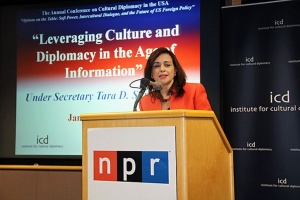Difference between revisions of "Tara D. Sonenshine"
m (Robertson moved page Hon. Tara D. Sonenshine to Tara D. Sonenshine) |
|||
| Line 1: | Line 1: | ||
| + | [[File:Sonenshine.jpg|400x200px|thumbnail|left]] | ||
| + | |||
| + | |||
| + | Tara D. Sonenshine joined the USIP leadership team in January 2009 as Executive Vice President. In that capacity, Sonenshine oversees strategic planning, public outreach and publications. She also manages the planning of the Public Education Center that will be part of the Institute’s new Headquarters project on the National Mall. | ||
| + | |||
| + | ==Biography== | ||
| + | |||
| + | Prior to joining USIP, she was a strategic communications adviser to many international organizations including USIP, the International Crisis Group, Internews Networks, CARE International, the American Academy of Diplomacy and Women of Washington. Sonenshine has served in various White House capacities, including transition director for the National Security Council (NSC). Sonenshine is the recipient of 10 News Emmy Awards in broadcast journalism. She is also the former Executive Vice President of United States Institute of Peace. | ||
| + | |||
| + | |||
| + | ==Learn More== | ||
| + | |||
Leveraging Culture and Diplomacy in the Age of Information | Leveraging Culture and Diplomacy in the Age of Information | ||
By The Hon. Tara D. Sonenshine (Under Secretary of State for Public Diplomacy and Public Affairs, US State Department) | By The Hon. Tara D. Sonenshine (Under Secretary of State for Public Diplomacy and Public Affairs, US State Department) | ||
| − | |||
| − | |||
When we bridge [[Culture|cultures]], we don’t just enshrine what people treasure, we build richer, more diverse, and mutually trusting partnerships for the future. And that makes Cultural Diplomacy an essential tool for the 21st Century. | When we bridge [[Culture|cultures]], we don’t just enshrine what people treasure, we build richer, more diverse, and mutually trusting partnerships for the future. And that makes Cultural Diplomacy an essential tool for the 21st Century. | ||
| Line 20: | Line 30: | ||
- The ICD Annual Conference on Cultural Diplomacy in the USA; Washington D.C., January 9th, 2013 | - The ICD Annual Conference on Cultural Diplomacy in the USA; Washington D.C., January 9th, 2013 | ||
| + | |||
| + | |||
| + | ==External Links and References== | ||
| + | |||
| + | [http://www.cd-n.org/index.php?under-secretary-tara-d-sonenshine The ICD Annual Conference on Cultural Diplomacy in the USA] | ||
[[Category:Statements on the Significance of Cultural Diplomacy]] | [[Category:Statements on the Significance of Cultural Diplomacy]] | ||
Revision as of 09:06, 19 August 2014
Tara D. Sonenshine joined the USIP leadership team in January 2009 as Executive Vice President. In that capacity, Sonenshine oversees strategic planning, public outreach and publications. She also manages the planning of the Public Education Center that will be part of the Institute’s new Headquarters project on the National Mall.
Biography
Prior to joining USIP, she was a strategic communications adviser to many international organizations including USIP, the International Crisis Group, Internews Networks, CARE International, the American Academy of Diplomacy and Women of Washington. Sonenshine has served in various White House capacities, including transition director for the National Security Council (NSC). Sonenshine is the recipient of 10 News Emmy Awards in broadcast journalism. She is also the former Executive Vice President of United States Institute of Peace.
Learn More
Leveraging Culture and Diplomacy in the Age of Information By The Hon. Tara D. Sonenshine (Under Secretary of State for Public Diplomacy and Public Affairs, US State Department)
When we bridge cultures, we don’t just enshrine what people treasure, we build richer, more diverse, and mutually trusting partnerships for the future. And that makes Cultural Diplomacy an essential tool for the 21st Century.
…
As the African playwright, Wole Soyinka, once said, ‘What politics demonizes, culture humanizes.’ With one song, Cultural Diplomacy helped us sidestep politics, and contextualize our values and policies in a very human way. The question isn’t whether we should participate in Public Diplomacy - of which Cultural Diplomacy is a major part - but how we can harness Cultural Diplomacy as a force for good.
…
Cultural Diplomacy can be a force multiplier that enhances relationships, builds understanding, advances prosperity, and strengthens our own national security. It starts with recognizing that culture is more than its paintings, relics, churches, or cuisine. It is about the human aspirations they represent.
…
While real people add impact to our Cultural Diplomacy, our support for the restoration and protection of cultural sites and artifacts everywhere sends an equally powerful message: that we are committed to national heritage.
- The ICD Annual Conference on Cultural Diplomacy in the USA; Washington D.C., January 9th, 2013
